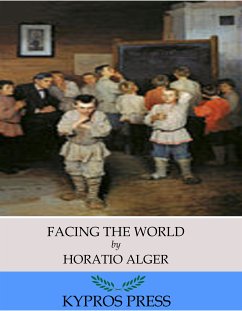
Randy Of The River (Illustrated) (eBook, ePUB)
Versandkostenfrei!
Sofort per Download lieferbar
0,99 €
inkl. MwSt.
Weitere Ausgaben:

PAYBACK Punkte
0 °P sammeln!
I am going fishing, Randy. Do you want to go along?" "With pleasure, Jack," answered Randy Thompson, a bright, manly youth of fourteen. "Are you going on foot or in your boat?" "I think we might as well take the boat," returned Jack Bartlett, a boy who was but a few months older than Randy. "Have you your lines handy?" "No, but I can get them in less than ten minutes." "All right. Meet me at the dock in quarter of an hour. I was thinking of going up the river to Landy's Hole. That's a good spot, isn't it?" "I think so. Last season I was up there and caught fourteen good-sized fish." "They tell...
I am going fishing, Randy. Do you want to go along?" "With pleasure, Jack," answered Randy Thompson, a bright, manly youth of fourteen. "Are you going on foot or in your boat?" "I think we might as well take the boat," returned Jack Bartlett, a boy who was but a few months older than Randy. "Have you your lines handy?" "No, but I can get them in less than ten minutes." "All right. Meet me at the dock in quarter of an hour. I was thinking of going up the river to Landy's Hole. That's a good spot, isn't it?" "I think so. Last season I was up there and caught fourteen good-sized fish." "They tell me you are one of the best fishermen in Riverport, Randy," went on Jack Bartlett, admiringly. "What is the secret of your success?" "I don't know unless it is patience," answered Randy, with a broad smile. "To catch fish you must be patient. Now when I caught my mess of fourteen two other boys were up to the Hole. But just because the fish did not bite right away they moved away, further up the river. But by doing that they got only about half as many as myself." "Well, I am willing to be patient if I know I am going to catch something." At this Randy laughed outright. "You can't be sure of anything-in fishing. But I always reckon it's a good thing to hold on and give a thing a fair trial." "I reckon you're right, Randy, and I'll give the fishing a fair trial to-day," answered Jack Bartlett. "Remember, the dock in quarter of an hour," he added, as he moved away. Horatio Alger, Jr. (January 13, 1832 - July 18, 1899) was a prolific 19th-century American author, best known for his many juvenile novels about impoverished boys and their rise from humble backgrounds to lives of middle-class security and comfort through hard work, determination, courage, and honesty. His writings were characterized by the "rags-to-riches" narrative, which had a formative effect on America during the Gilded Age. Alger's name is often invoked incorrectly as though he himself rose from rags to riches, but that arc applied to his characters, not to the author. Essentially, all of Alger's novels share the same theme: a young boy struggles through hard work to escape poverty. Critics, however, are quick to point out that it is not the hard work itself that rescues the boy from his fate, but rather some extraordinary act of bravery or honesty, which brings him into contact with a wealthy elder gentleman, who takes the boy in as a ward. The boy might return a large sum of money that was lost or rescue someone from an overturned carriage, bringing the boy-and his plight-to the attention of some wealthy individual. It has been suggested that this reflects Alger's own patronizing attitude to the boys he tried to help.
Dieser Download kann aus rechtlichen Gründen nur mit Rechnungsadresse in A, B, CY, D, DK, EW, E, FIN, F, GR, IRL, I, L, M, NL, P, S, SLO, SK ausgeliefert werden.













